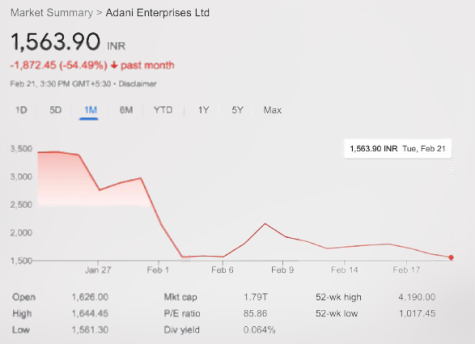Gautam Adani loses billions: What can we learn from his story?
Gautam Adani, the founder and chairman of the Adani Group, was born on June 24, 1962, in a small town in Gujarat, India.
The Adani Group, led by billionaire Gautam Adani, has suffered a massive decline in market value and net worth following accusations of stock-price manipulation, fraud, and money laundering by investment firm Hindenburg Research.
The conglomerate has lost over $135 billion in market cap, more than half its value, and Adani’s net worth has shrunk by nearly $72 billion this year, raising questions about the financial validity of Adani’s claims and his questionable approach to the management of funds.
Here are five financial lessons that students can learn from the Adani Group’s losses:
1. It’s crucial to diversify
The Adani Group’s losses serve as a reminder of the importance of diversification in an investment portfolio. With Adani Group heavily invested in energy and infrastructure, the conglomerate’s significant losses demonstrate how putting all of your eggs in one basket can lead to significant risks and losses.
Investing in a variety of assets across different sectors can help to mitigate risks and provide a more balanced portfolio. A well-diversified portfolio that includes stocks, bonds, real estate, and other assets can help to minimize risk and maximize potential returns over the long term.
“Dollar cost averaging tends to help with diversification not only through sectors, but over time as well. Investing over time guarantees averaging the cost over the timeline of a few months to maximize returns,” said investor Rajeev Talreja.
2. Do your homework before investing
Before buying any firm, stock, or asset, one should do their homework thoroughly. This includes investigating finances, management, track record, and market trends. Investor worries and legal issues have resulted from claims of financial irregularities and poor management against the Adani Group. Making sure you do your due diligence will help you avoid potential fraud and scams and help you make better investing selections.
“[Investing and] business is successful through patience. That’ll help you reach your full potential,” said technopreneur Martynas Fedotovas.
3. Recognize the hazards involved
There are some risks associated with any investment. Understanding the risks involved and having a clear strategy for addressing them are crucial. The Adani Group’s heavy reliance on debt financing and its exposure to regulatory risks are just some of the factors that have contributed to its recent struggles. You can manage your portfolio more skillfully and make more educated decisions if you are aware of the risks associated with each investment.
“It’s all about drive and internal motivation when it comes to your investing goals. If you really wanted that progress, you could time the market perfectly,” said Berkeley Electrical Engineering and Computer Science student Hriday Sheth (‘25).
4. Keep your emotions in check

When it comes to investing, emotions may be a strong influence. Irrational financial decisions may result from a combination of fear, greed, and overconfidence. It is critical to control one’s emotions and base judgments on information and statistics. Investor worry and anxiety have increased in response to the recent Adani scandals, but it is crucial to maintain composure and base your decisions on personal financial objectives and risk tolerance.
“Don’t forget to enjoy life, but also plan for the future. Investing is a great way to do that, starting with very little per month,” said Genius Kids franchisor Rennu Dhillon.
5. Maintain a long-term outlook
Although short-term changes and market volatility might be unsettling, it is very important to maintain attention on your long-term financial objectives. The recent troubles of the Adani Group may be a short-term setback, but it is critical to keep in mind that investing is a marathon, not a sprint. You can weather any short-term storms and eventually reach your financial objectives by having a clear investing strategy and a long-term view.
In conclusion, the Adani Group’s recent losses serve as a cautionary tale for student investors, highlighting the importance of diversification, due diligence, risk management, emotional control, and long-term planning. By learning from these lessons, students can make informed decisions and work towards their financial goals with greater confidence, security, and insight.
Your donation will support the student journalists in the AVJournalism program. Your contribution will allow us to purchase equipment and cover our annual website hosting costs.

